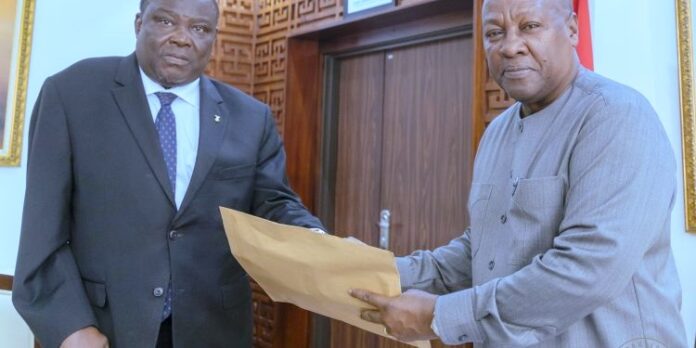The Article 146 Committee of Inquiry has revealed that it received extensive evidence regarding the first petition seeking the removal of Chief Justice Gertrude Araba Esaaba Sackey Torkornoo.
Committee Chairman Gabriel Scott Pwamang disclosed that petitioner Daniel Ofori presented his case through 13 witnesses, while the suspended Chief Justice mounted her defence with 12 witnesses.
“We received evidence from Mr. Daniel Ofori, the first petitioner, through thirteen witnesses. Similarly, the Chief Justice, in her defence, also called twelve witnesses, including expert witnesses, as she is entitled to do under the Constitution,” Mr. Pwamang said at the presidency on Monday, September 1, while presenting the committee’s recommendations on the first petition.
He further confirmed that the Chief Justice testified personally at the inquiry and was cross-examined.
According to the committee, nearly 10,000 pages of documentary exhibits were examined, with both the petitioner and the Chief Justice represented by four lawyers each.
“The committee received about 10,000 pages of documentary exhibits from both sides,” Mr. Pwamang added.
The committee stressed that the proceedings were held in camera, but not in secrecy, in line with constitutional provisions.
“Mr. President, without disclosing the substance of the proceedings, and since in camera proceedings are not the same as in secret, we can state that in respect of the first petition…” Mr. Pwamang stated.
Meanwhile, proceedings on the second petition seeking the removal of Chief Justice Gertrude Torkornoo have been adjourned following a joint request by both the petitioner and the Chief Justice.
The Committee, which is investigating three separate petitions submitted to President John Mahama in March this year, had intended to proceed with the second petition after concluding hearings on the first. However, both the second petitioner and the Chief Justice formally requested an adjournment.
Chairman of the Committee said the panel granted the request in the spirit of fairness and due process, emphasizing that while the Committee is mandated to act expeditiously, it also recognizes the need to ensure all parties are adequately prepared to present their cases.
Source: Albert Kuzor


